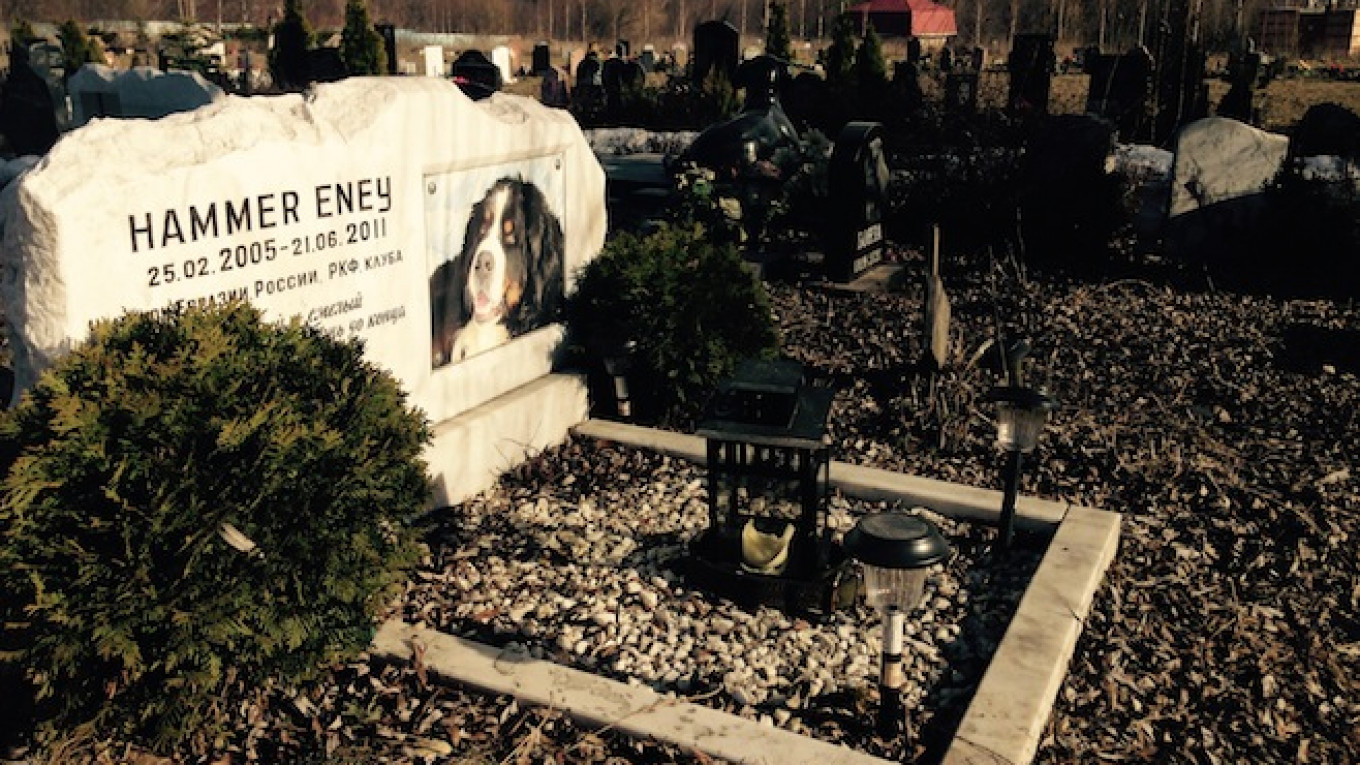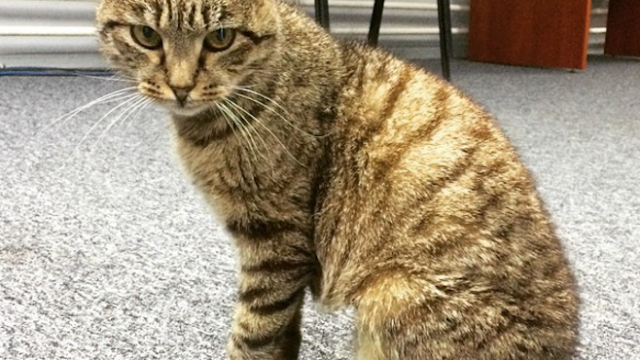Moscow's first and only pet cemetery is resplendent, if underutilized.
Though burial grounds for families' four-legged companions have long been the norm in the West, the Russian capital only got its first such lot in 2007. The opening of what is known simply as the "Moscow official pet cemetery" was a lavish occasion, attended by such city elites as then-mayor Yury Luzhkov.
Nestled in northern Moscow's Kurkino district, the cemetery offers a solemn oasis to animal lovers wishing to mourn their losses with marble monuments, bronze life-sized models of their deceased four-legged friends, a crypt and even an elite “Heroes Alley” for good measure.
Sumptuous and expansive though the graveyard may be — it is equipped to hold the remains of some 30,000 pets, though only about 2,000 burial plots are currently occupied — many Muscovites still prefer to take matters into their own hands, shunning big spending and bureaucracy in favor of an intimate, albeit illegal, family burial.
“There is a common misconception that our pet cemetery is only for rich people,” said graveyard manager Andrei Zhuravlyov in an interview with The Moscow Times. “We do have celebrities and prominent political figures among our clients, but 80 percent of those who use our services are middle-class or lower-income people, who simply want the memories of their pets to be carefully guarded.”
The concept may be relatively novel to Russia, but the cemetery's management has displayed an entrepreneurial spirit, striving to meet the demands of every client, no matter how unique.
“A pet funeral is a touching event,” Zhuravlyov said. “For many people, their beloved animal is as close as a relative. They put collars, toys, notes and their pet's favorite treats in the graves, and they play songs as their animals' remains go into the earth.”
Though most of the graves festooning Moscow's animal burial grounds belong to cats and dogs, some among the cemetery's fallen are more exotic, including parrots, polecats and even a monkey.
Neither the graveyard nor the law imposes restrictions on the type of animal that can be buried in Kurkino.
Mandatory Cremation
One key requirement that has put off many a Muscovite, however, is the ban on burying corpses. Those wishing to utilize the graveyard must first cremate their pets.
Moscow law strictly prohibits burying dead animals or tossing them in the garbage. As an animal decomposes, its body produces toxic gases. If the burial depth isn’t sufficient, these gases can create unsanitary conditions, even contaminating the groundwater.
So even within the confines of Moscow's official pet cemetery, mourners' options are limited to burying an urn containing the animal's cremated remains, not the body of the pet itself.
The cemetery offers its own cremation service, as do the majority of Moscow's veterinary clinics.
Private cremation companies, such as Zoovetritual or Kremus, are available 24 hours a day to collect deceased pets on short notice.
But despite the plethora of services specially equipped to handle the grim task, many Moscow mourners would prefer to go rogue, opting to bury their pets themselves.
Some disapprove of the idea of cremation on philosophical grounds, others fail to see the purpose of such fanfare, and some simply can't afford the service, prices for which start at 2,000 rubles, or $38.
Of the tens of thousands of pets that die each year in Moscow, a great many are secretly buried in
parks, yards and playgrounds. One of the largest unofficial such cemeteries is situated in the capital's eastern outskirts, where the remains of dozens of departed pets lie.
There are no official statistics, as the majority of domesticated animals in Russia are unregistered.
A Slowly Booming Business
Still, Muscovites are slowly but surely warming to the idea of cremation.
“In the three years our company has been on the scene, we've noticed a slight but constant increase in demand for our services. I attribute the growth in demand to the fact that more and more people are becoming aware of the availability of such services,” said Alexander Ostanin, the director of Zoovetritual.
However both the director of the cemetery and the cremation service's manager agree that their business is seasonal. Demand increases in the winter, but it decreases considerably in the summertime. When the ground gets soft, most mourners prefer to bury their pets themselves in the countryside.
An Arduous Farewell
Those who have recently lost a pet can opt for either individual or communal cremation.
Prices for the communal option start at 2,000 rubles, and increase in proportion to the animal's weight and size. According to Ostanin, most pet owners prefer this option, as it is the least costly.
Still, many prefer to pay 2-3 times more for an individual service. In this case, the owner is invited to observe every stage of the procedure, and receive a box containing their four-legged buddy's ashes in the end. For those who unwilling to view the cremation itself, video evidence will be provided so as to dispel fears that their pets were cremated en masse despite the extra fee.
In keeping with the law, once cremated, an animal's remains should be placed in an urn and either kept at home or buried in the official pet cemetery. Urns range from 2,000 rubles for a ceramic one to 10,000 rubles ($192) for a wooden version.
An individual plot of land in the cemetery can be prohibitively costly for some, starting at 5,000 rubles ($96) annually. For a spot in the coveted “Heroes Alley,” mourners can expect to pay twice that amount.
Some among the thousands of pet owners who have shelled out the cash to bury their beloved in Kurkino mourn devoutly, showing up regularly to pay their respects.
But for many, accessibility is a problem. The cemetery is difficult to access by public transportation, which creates difficulties for city residents without their own cars. Those wishing to visit the grounds must take the metro to Rechnoy Vokzal at the end of the Green Line, and then a bus to the Mega mall in Khimki and then go by foot for another 20-30 minutes.
“We are planning to launch another pet cemetery in the south of Moscow as soon as we manage to get a suitable plot of land,” said Zhuravlyov. “Actually, we've been trying to make this happen for years but the authorities think that there is no need.”
There are nearly 600 pet cemeteries across the United States.
The first of its kind, New York's Hartsdale Cemetery, was founded in 1896. It now serves as the final resting place for more than 80,000 pets of every description, including snakes, spiders, turtles and even a lion that had belonged to Hungarian Princess Vilma Lwoff-Parlaghy before it died in 1912.
Contact the author at [email protected]
A Message from The Moscow Times:
Dear readers,
We are facing unprecedented challenges. Russia's Prosecutor General's Office has designated The Moscow Times as an "undesirable" organization, criminalizing our work and putting our staff at risk of prosecution. This follows our earlier unjust labeling as a "foreign agent."
These actions are direct attempts to silence independent journalism in Russia. The authorities claim our work "discredits the decisions of the Russian leadership." We see things differently: we strive to provide accurate, unbiased reporting on Russia.
We, the journalists of The Moscow Times, refuse to be silenced. But to continue our work, we need your help.
Your support, no matter how small, makes a world of difference. If you can, please support us monthly starting from just $2. It's quick to set up, and every contribution makes a significant impact.
By supporting The Moscow Times, you're defending open, independent journalism in the face of repression. Thank you for standing with us.
Remind me later.






